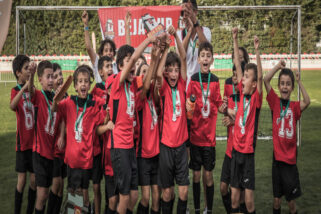The days of marking the “School Day of Non -Violence and Peace” were confronted with images of an episode of violence in a school, that shocked the whole society, taking, however, unnoticed the news that gives us the need for implementation in schools of a radicalization prevention program.
Colonel of the GNR, Master in Law and Security and Homeland Security Auditor
Director of the National Association of Guard Officers
The “School Day of Non-Violence and Peace” is annually 30 January, which objective is to alert the entire school community and governments to the need for a peace education, that promotes values such as respect, equality, The tolerance, Solidarity, Cooperation and non -violence, checking up, however, that combating violence in the school environment is a daily mission, As reported by CM, on 24 January in the article "GNR called the Moita School after aggressions between students".
Although this occurrence is severe and deserved by all institutions, that deal with the phenomenon of violence in the school environment, A suitable answer, whose subject has already approached here at the Newsletter Noticias, However, it is more worrying, the alerts transmitted, In two RR articles of the day 14 January with the title “Terrorism: Country should be aware of the possible return of families of Portuguese extremists” e “'You shouldn't motivate alarm', but surveillance of the authorities, says Oscot", that give us that “radicalized are increasingly younger and are not mostly in large cities. Specialist warns of short -term problem that already occurs in another countries and speaks of the importance of following tracks and tracking suspects ”and that the“ prosecutor warns of possible return to Portugal of women and children of extremists. Safety and crime observatory argues that everyone has responsibility to watch and interact with the authorities, But you understand that ‘It is not a matter that motivates, for now, alarm'".
IS in the day 15 January, also the RR, gives account in the article “Justice needs psychologists 'trained in extremism and radicalization'", that “DCIAP's responsible investigation warns that cases of radicalization do not only happen in disadvantaged social media” and that the coordinator in the Judicial Police Combating Unit arguing that at the “level of schools there should be greater proactivity to combat The hate speech, This narrative, because most of these young people live in such a digital bubble and only know this reality. It was very important to have active programs to tell them, a way a way, that this is not the way and point to them what the consequences are ”.
On the subject of radicalization, Already here we had the opportunity to address the theme in the article “Good practices to combat the VERLT", of 29 August 2018, cuja sigla VERLT significa “Violent Extremism and Radicalisation Leading to Terrorism”, where we intend to make known what good practices existing in the context of proximity policing in combating radicalization leading to the adoption of ideologies based on violent extremism, As or terrorism.
As referred to in the article, the Security Forces (FS) They are responsible for combating terrorism, where proximity policing can contribute positively to combating radicalization leading to the adoption of ideologies based on violent extremism, As or terrorism, in our country.
But FS also play a fundamental role in combating the radicalization of hate discourse in schools, acting in both prevention and direct intervention, Being one of the main instruments for this performance the “SECURE SCHOOL PROGRAM” (PES), which aims to ensure the safety and tranquility of the school environment, promoting peaceful coexistence and respect among students.
The school environment, that must be a learning space, conviviality and formation for citizenship, has faced a growing challenge: the propagation and radicalization of hate speech between children and adolescents, whose phenomenon reflects broader social tensions, worrying teachers, parents, Specialists and FS, putting at risk not only the safety and well-being of students, but also the very mission of schools.
The discourse of hate in the school context can manifest in various ways, from insults and bullying to the dissemination of discriminatory ideas against colleagues based on their race, gender, sexual orientation, religion, nationality or other characteristics, in some cases, These behaviors are influenced by extremist discourses that young people absorb at home, on the internet or in social groups, where the school, as a microcosm of society, ends up reflecting and, sometimes, amplifying these dynamics.
To face this challenge, It is essential that schools adopt a proactive and multifaceted approach, where in the first place, It is essential to promote “education for citizenship and human rights”, teaching students how to value diversity and resolve conflicts in a peaceful way, being the awareness of the dangers of hate discourse and the importance of mutual respect being integrated into the school curriculum.
Besides, Schools need to create “dialogue and support channels” so that students feel safe in reporting cases of bullying or discrimination, being the participation of psychologists, social workers and other crucial professionals to identify and intervene in risk situations, Families should be involved in the process, promoting awareness about the impact of hate discourse and the need for a domestic environment that values respect and empathy.
Lastly, public policies also play a key role, governments and schools should invest in training continues for teachers, adequate pedagogical resources and awareness campaigns that address the theme in a clear and accessible way, where FS can also contribute to the fight against the radicalization of hate speech in schools.
This phenomenon is embodied in a complex challenge that requires the collaboration of all actors, including FS, the school community, families and students themselves, playing the pes a crucial role in this effort, acting as a bridge between FS and the school community, through preventive actions, educational and mediation, contributing to create a safer school environment, inclusive and respectful, where all young people can develop fully, free of violence and discrimination.
Radicalization of hate speech in schools is a complex problem, but not insurmountable, so with coordinated efforts between teachers, families, students, FS and society as a whole, It is possible to turn schools into spaces of inclusion, respect and learning, where all children and adolescents can develop in a healthy and safe way and where episodes of violence like last Friday have no place.
Note: The text constitutes the exclusive and unique opinion of its author, which only binds to this and do not reflect the opinion or position of the institution where it provides services.

























